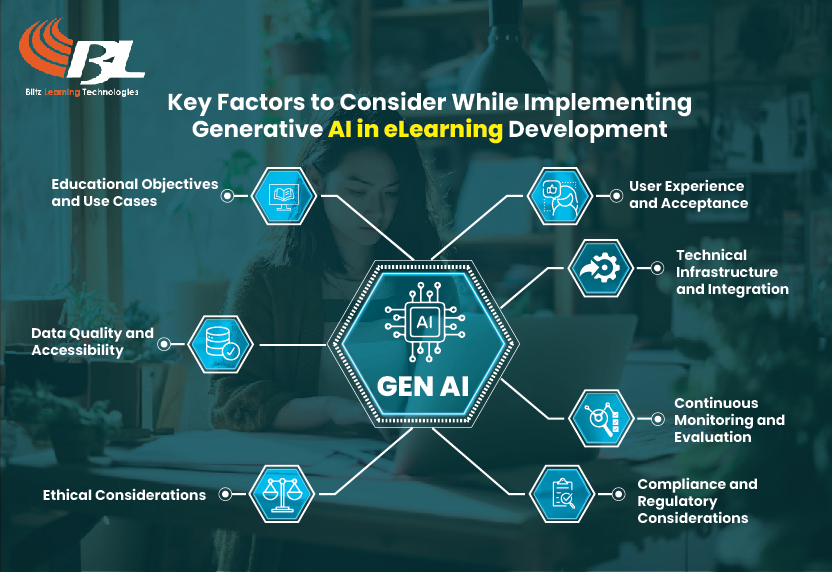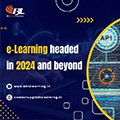
Blog
- Home
- Blog

11Jul
Key Factors to Consider While Implementing Generative AI in eLearning Development
Introduction:
In the realm of eLearning, the integration of Generative Artificial Intelligence (AI) holds tremendous promise for transforming how educational content is created, delivered, and personalized. However, successful implementation of Generative AI requires careful consideration of various factors to ensure effectiveness, efficiency, and ethical use. This blog explores the key factors that educational institutions and corporate training programs should consider when integrating Generative AI into eLearning development processes.
Understanding Generative AI in eLearning
Generative AI refers to AI technologies that can generate content-such as text, images, videos, and simulations-that mimics human-created material. In eLearning, Generative AI can automate content creation, personalize learning experiences, facilitate language translation, and enhance interactive elements, thereby optimizing the overall educational experience.
Key Factors to Consider :
1. Educational Objectives and Use Cases: Before implementing Generative AI, clearly define your educational objectives and identify specific use cases where AI can add value. Consider which aspects of eLearning development-such as content creation, personalization, assessment, or accessibility-could benefit most from automation and AI-driven insights. Align AI initiatives with your institution's strategic goals and educational outcomes to ensure meaningful impact.
2. Data Quality and Accessibility: Generative AI relies heavily on data to generate accurate and relevant content. Ensure that your eLearning platform collects, stores, and maintains high-quality data, including learner interactions, performance metrics, and content preferences. Accessible and well-organized data sets enable AI algorithms to make informed decisions and deliver personalized learning experiences effectively.
3. Ethical Considerations: Maintain ethical standards throughout the implementation of Generative AI in eLearning. Ensure transparency in how AI-generated content is created and presented to learners. Avoid bias in AI algorithms by regularly auditing and refining machine learning models. Respect intellectual property rights when using AI to generate, curate, or translate educational content. Educate stakeholders-educators, learners, and administrators-about the ethical implications of AI in education and foster a culture of responsible AI use.
4. User Experience and Acceptance: Consider the impact of AI-driven features on the user experience of educators and learners. Ensure that AI tools are intuitive, user-friendly, and seamlessly integrated into existing eLearning platforms. Provide training and support for educators to familiarize them with AI capabilities and best practices. Solicit feedback from users throughout the implementation process to identify usability issues, gather insights, and make iterative improvements.
5. Technical Infrastructure and Integration: Assess your institution's technical infrastructure and capabilities to support Generative AI implementation. Evaluate the scalability of AI solutions, compatibility with existing eLearning systems, and data security measures. Collaborate with IT professionals and AI experts to ensure smooth integration, optimize system performance, and mitigate potential technical challenges.
6. Continuous Monitoring and Evaluation: Implementing Generative AI is a dynamic process that requires ongoing monitoring, evaluation, and refinement. Establish metrics and performance indicators to assess the impact of AI-driven initiatives on learner engagement, content effectiveness, and educational outcomes. Use analytics and data-driven insights to iteratively improve AI algorithms, personalize learning experiences, and adapt to evolving educational needs.
7. Compliance and Regulatory Considerations: Stay informed about regulatory requirements and compliance standards related to AI technology in education. Adhere to data privacy regulations-such as GDPR or CCPA-when collecting, storing, and processing learner data. Collaborate with legal advisors to ensure that AI implementations align with institutional policies and ethical guidelines.
Future Directions and Innovation
As Generative AI continues to advance, explore opportunities to leverage emerging technologies-such as natural language processing, machine learning, and augmented reality-in eLearning development. Stay updated on industry trends, research findings, and innovative applications of AI in education to maintain a competitive edge and deliver impactful learning experiences.
Conclusion:
Integrating Generative AI into eLearning development presents exciting opportunities to enhance efficiency, personalize learning experiences, and improve educational outcomes. By carefully considering these key factors-educational objectives, data quality, ethical considerations, user experience, technical infrastructure, monitoring and evaluation, and compliance-educational institutions and corporate training programs can successfully harness the power of AI to create engaging and effective eLearning environments. As we navigate this transformative journey, collaboration between educators, technologists, and learners will be essential in maximizing the benefits of Generative AI and shaping the future of education.

Neti
About authorNeti is a dynamic professional with a diverse background in human resources, operations, and personality development training. Recognized as a transformative leader, she empowers others as a sought-after mentor, leveraging her deep understanding of human behavior. An avid reader and traveler, she applies her global mindset to innovative problem-solving in the e-learning industry, where she leads the development of cutting-edge educational platforms. Her journey exemplifies versatility, resilience, and a commitment to personal and professional growth.



Leave a comments